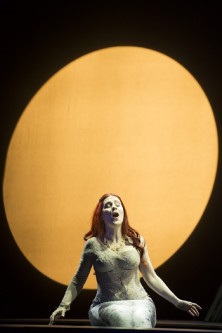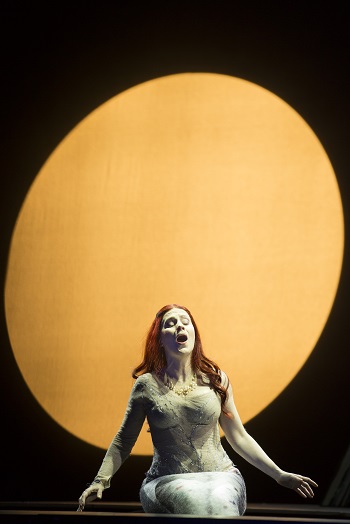 United Kingdom Dvořák, Rusalka: Scottish Opera / Stuart Stratford (conductor), Theatre Royal, Glasgow, 5.4.2016. (SRT)
United Kingdom Dvořák, Rusalka: Scottish Opera / Stuart Stratford (conductor), Theatre Royal, Glasgow, 5.4.2016. (SRT)

(c) James Glossop
Dvořák, Rusalka
Cast:
Rusalka – Anne Sophie Duprels
Merman – Sir Willard White
The Prince – Peter Wedd
Ježibaba – Leah-Marian Jones
Foreign Princess – Natalya Romaniw
Gamekeeper – Julian Hubbard
Kitchen Boy – Clare Presland
Singing Dryads – Elin Pritchard, Emma Kerr, Sioned Gwen Davies
Production:
Director & Designer – Antony McDonald
Lighting – Wolfgang Goebbel
Movement – Lucy Burge
Associate Costume Designer – Gabrielle Dalton
Antony McDonald’s production of Rusalka first saw the light of day at Grange Park in 2008. It looks great on the stage of Glasgow’s Theatre Royal, its frame-shaped inner proscenium and monochrome designs offsetting the luminous colours that accompany the magical characters. His expressionistic evocation of the lake is a stroke of genius, giving the water-borne characters the space to flap around without looking ridiculous, and the angular trees work with Ježibaba’s hut to suggest a sense of the uncanny, offset by the quietly beautiful moon. Its finest asset, though, is the way McDonald doesn’t shy away from the tale’s darker aspects. We see Ježibaba hacking savagely at Rusalka’s fishy tail, replacing it with scarred, unstable legs, and the second act does a very unsettling job of revealing how the world of humans isolates, intimidates and objectifies the poor love-struck nymph.
Anne Sophie Duprels and Willard White starred in the original production at Grange Park, and their experience is very telling here. Duprels took a little bit of time to settle into the part, and she attacked the Song to the Moon from consistently below the note, but her pleas to Ježibaba were deeply heartfelt, and by the time of the final act she achieves rare nobility together with a silvery beauty to her voice that fitted the moonlit setting perfectly. White has a baleful edge to his Merman, but he booms his warnings of woe very effectively, even if he’s now a little stretched at the top. No such problems for Peter Wedd, who seems to be developing into the best Heldentenor that Britain has to offer. He attacks the role with all the Wagnerian ardour it requires while never sounding pressed, and he marries this with golden beauty that sets his interpretation apart as special. Scottish Opera veteran Leah-Marian Jones has a whale of a time as Ježibaba, using a slight edge of shrillness to point up the character’s cruelty, and Natalya Romaniw makes a stunning company debut as the Princess; a true soprano with sit-up-and-notice power to her voice that made her much more than just an add-on.
Not only is this Scottish Opera’s first Rusalka, but this was also the first performance to be conducted by Stuart Stratford since he took up his position as the company’s Music Director. He confirmed his potential in last year’s Jenůfa as a master of pacing and storytelling. I hope he’s going to be good news for the company: they could do with some. Maybe it was because of Stratford, or maybe it was because I’m more used to hearing them in the bigger (and drier) acoustic of the Edinburgh Festival Theatre, but the orchestra sounded really terrific, perfectly sized for this auditorium and full of glittering colours that offset Dvorak’s folk harmonies, as well as the score’s richer late-Romantic harmonies. With 2015’s Jenůfa, this makes two Aprils in a row where Stuart Stratford has conducted Scottish Opera in a Czech opera with top performances both on the stage and in the pit. Prague Spring, perhaps?
Simon Thompson
Rusalka continues at Glasgow’s Theatre Royal until Saturday 9th April and then at the Edinburgh Festival Theatre until Saturday 16th April.
